This is the eighth post in the Mindful Eating series. To view other posts, please visit:
(1) Learning to Eat Mindfully
(2) Thinking about Food
(3) Choosing the Foods We Eat
(4) Cooking with Awareness
(5) Serving Food Thoughtfully
(6) Preparing to Eat
(7) Experiencing the Meal
(8) Cleaning with Intention
(9) Conclusion
 Now that you’ve finished eating, it is time to wash up. Do not put it off until later; take good care of this present moment. Cleaning is a way of returning objects and spaces to their original state so that they are ready for the next meal, the next family night, the next impromptu snack.
Now that you’ve finished eating, it is time to wash up. Do not put it off until later; take good care of this present moment. Cleaning is a way of returning objects and spaces to their original state so that they are ready for the next meal, the next family night, the next impromptu snack.
Cleaning the kitchen (the dishes and utensils used, the cookware, the food left over, the counters, the linens, the floor) in mindfulness is a way of recognizing that you will prepare food again soon. There is abundance in your life. It is a hopeful act.
“Cooking makes cleaning possible, cleaning makes cooking possible.”
~ Edward Espe Brown
First, put away any leftover food for another time. If possible, store foods in glass containers, rather than plastic. As you store it away, consider the importance of your refrigerator/freezer in your everyday life. Think of how fortunate you are to own such an amazing and wonderful machine, a machine that allows you to keep foods much, much longer before having to consume them.
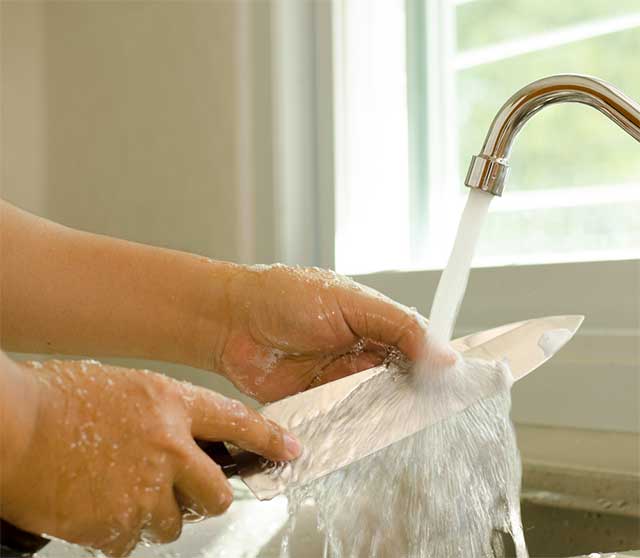 If you haven’t already done so during preparation, gently wash, dry and store your knife safely. No single piece of kitchen equipment is as helpful as a sharp, well-made knife. As you clean your knife with water and a soft cloth or sponge, be mindful. Recognize not only its beautiful construction or its usefulness in chopping vegetables and fruits, but also its inherent danger, and treat it with care and respect.
If you haven’t already done so during preparation, gently wash, dry and store your knife safely. No single piece of kitchen equipment is as helpful as a sharp, well-made knife. As you clean your knife with water and a soft cloth or sponge, be mindful. Recognize not only its beautiful construction or its usefulness in chopping vegetables and fruits, but also its inherent danger, and treat it with care and respect.
Recognize that you are very fortunate. You only have to walk to the sink and turn the handle, and cold or hot water comes pouring out. How lovely that you do not have to walk to a river or lake, as many people all over the world do, to bring back buckets of water every day. How nice that you do not have to build a fire to heat it. This running water was made possible by the work of many minds and many hands.
Now, it is time to wash dishes. When you wash a dish, you remove everything that is unnecessary from it. You leave only the dish, gleaming and empty, ready to be used again to hold food. Wash each dish gently and carefully as though it were a precious baby or a sacred object. Allow the whole of your attention to settle into the motion 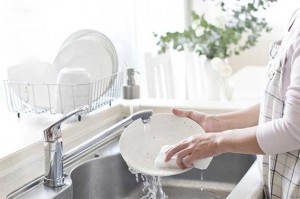 of cleaning the dish, into the suds, into the warmth. Feel the water on your skin. Feel the dish heavy in your hands or the spoon with its perfect curve. Notice your breathing, the way you’re standing, the feeling of fullness in your belly. Come home to your body and fully experience washing each dish.
of cleaning the dish, into the suds, into the warmth. Feel the water on your skin. Feel the dish heavy in your hands or the spoon with its perfect curve. Notice your breathing, the way you’re standing, the feeling of fullness in your belly. Come home to your body and fully experience washing each dish.
“Every minute can be a holy, sacred minute. Where do you seek the spiritual? You seek the spiritual in every ordinary thing that you do every day. Sweeping the floor, watering the vegetables, and washing the dishes become holy and sacred if mindfulness is there. With mindfulness and concentration, everything becomes spiritual.”
~ Thich Nhat Hanh
Think about each dish that you wash. Where was the clay found? What machinery was used to shape and fire it? Who painted the designs? Who inspected it? Who delivered it to the store? What meals has it held? Think of all the elements that were necessary for this plate or bowl to be in your hands and allow yourself to feel gratitude.
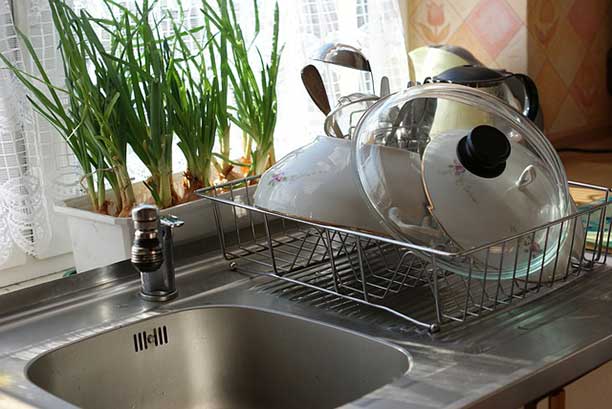 When you have finished washing the dishes, it is time to turn your attention to the cookware. What method of cleaning is best for your particular type of cookware? Is it cast iron? Glass? Stainless steel? You should know how best to care for these items so that they will maintain their good condition for many years. This information is easy to find on the Internet. (Remember, you should not cook in aluminum or Teflon or copper because these materials impart toxins into the food that are not safe to eat.)
When you have finished washing the dishes, it is time to turn your attention to the cookware. What method of cleaning is best for your particular type of cookware? Is it cast iron? Glass? Stainless steel? You should know how best to care for these items so that they will maintain their good condition for many years. This information is easy to find on the Internet. (Remember, you should not cook in aluminum or Teflon or copper because these materials impart toxins into the food that are not safe to eat.)
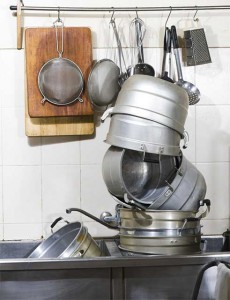 Take your time scrubbing the cooking pot or the sauté pan, and look at it with mindfulness. Where did it come from? How was it made? Who mined the iron? Who designed the soup pot? Who poured the glass into the mold or inspected the rough cast iron pan before it was packed into a box? How did the mining of the elements used affect the plants and animals, the earth, the people who lived in the area, the miners and their families? Think, also, of the many meals this cookware has helped you to prepare.
Take your time scrubbing the cooking pot or the sauté pan, and look at it with mindfulness. Where did it come from? How was it made? Who mined the iron? Who designed the soup pot? Who poured the glass into the mold or inspected the rough cast iron pan before it was packed into a box? How did the mining of the elements used affect the plants and animals, the earth, the people who lived in the area, the miners and their families? Think, also, of the many meals this cookware has helped you to prepare.
After you have carefully washed and dried the cookware and put it where it belongs, the sink should be empty. Rinse and wring out your sponge so that it is ready to be used again when you need it. Spritz the counter with vinegar or another safe cleaner, and wipe it dry with a cloth. Make sure everything  on the counter is in its place. Notice whether items are kept where they are most easily utilized, and if not, rearrange them.
on the counter is in its place. Notice whether items are kept where they are most easily utilized, and if not, rearrange them.
Take the cloth you used to wash the counters and wipe out the sink. Keeping your sink clean and shining acts as a reminder that the kitchen is a sacred place used for something so essential. This sink is truly incredible. It helps bring clean running water into you home so that you have a constant supply for drinking, cooking and washing. How fortunate you are. And now, the sink is ready to be used for the next meal.
Look down at the floor to make sure nothing was spilled or splattered or dropped during preparation, and if it was, wash it up with your cloth or with a broom or mop. Then, put your cloth into the laundry basket, and place a clean, folded dishtowel on the counter.
Your goal is to return your kitchen to a condition of readiness. Look around you. Is there anything out of place? Is there anything that should be changed in order to make preparing food easier next time?
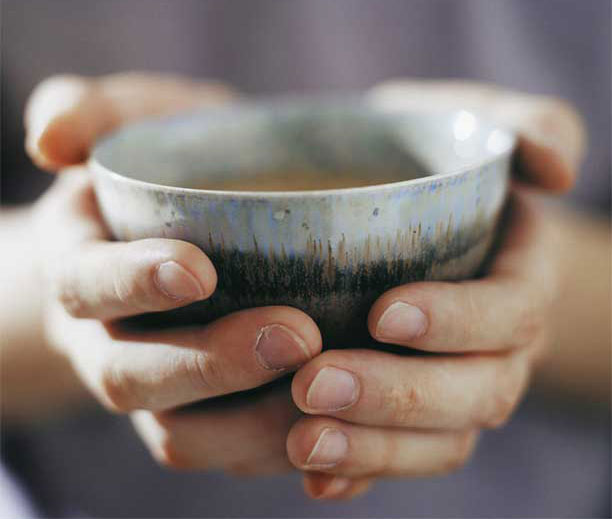 Once you have finished cleaning, it’s time to relax with a cup of tea or coffee or another drink you enjoy. Sip mindfully, noticing the fragrant tea leaves or coffee beans, the deep flavor, the warmth of the cup in your hands. See the tea or coffee clearly, the plants, themselves, the clouds that brought rain, the tilting of the Earth toward the sun, the tea pickers, the coffee harvesters, and know that the entire cosmos was necessary in order for this precious drink to be in your cup.
Once you have finished cleaning, it’s time to relax with a cup of tea or coffee or another drink you enjoy. Sip mindfully, noticing the fragrant tea leaves or coffee beans, the deep flavor, the warmth of the cup in your hands. See the tea or coffee clearly, the plants, themselves, the clouds that brought rain, the tilting of the Earth toward the sun, the tea pickers, the coffee harvesters, and know that the entire cosmos was necessary in order for this precious drink to be in your cup.
Drink mindfully, aware of the tea or coffee you are consuming, aware of your breathing, aware of you body. Allow your mind to settle. Take good care of this wonderful present moment, and fully enjoy this time. While you are drinking, there is nothing else – no anxieties about the future, no thoughts about the past, no planning, no projects. There is only the tea or the coffee and you.
“Drink your tea slowly and reverently, as if it is the axis on which the whole earth revolves – slowly, even, without rushing toward the future. Live the actual moment. Only this actual moment is life. Don’t be attached to the future. Don’t worry about things you have to do. Don’t think about getting up or taking off to do anything. Don’t think about ‘departing.'”
~ Thich Nhat Hanh
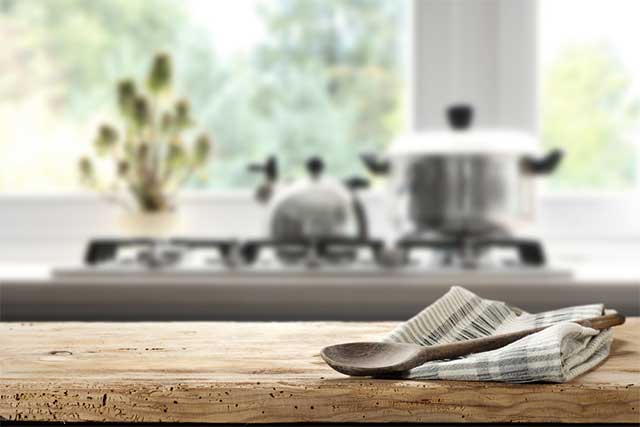
Taking time to do this is so satisfying and made even more so when one wakes to start the day in a clean and ready and uplifted kitchen. Thank you.